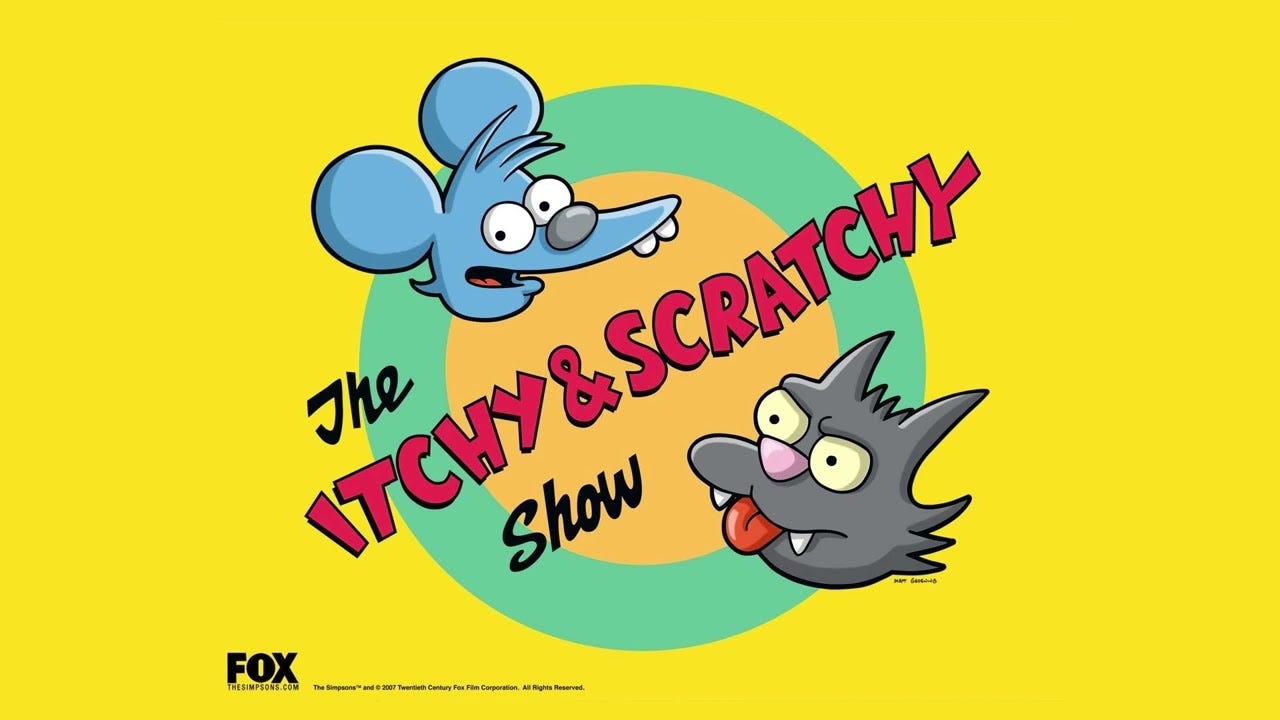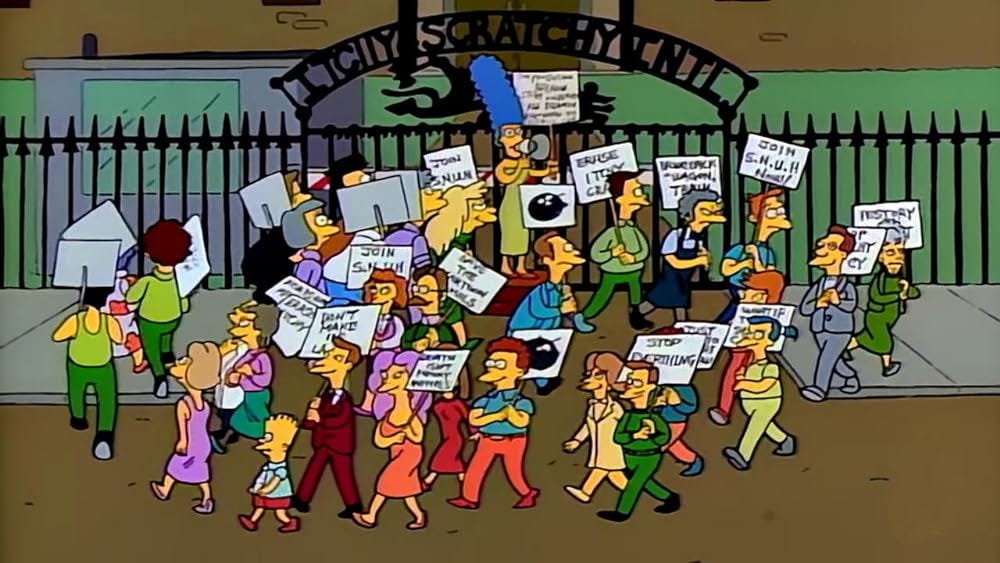There’s a running joke that “The Simpsons” is either prophetic or on some next-level predictive programming with the number of world events they have supposedly called correctly. There’s definitely some interesting coincidences that have occurred on the show, but perhaps not to the extent that some like to make out there are. And given it’s a satirical cartoon that’s been running for over 30 years, something parodied in the show was always likely to play out in real life at some point.
That doesn’t mean there aren’t things happening in society currently that “The Simpsons” has something interesting to say about. One of the more curious aspects of the show is how it handles discussion around television and cartoons - in particular, through the existence of “The Itchy & Scratchy Show”.
We fight!
We fight!
We fight! We fight! We fight!
Fight, fight fight! Fight, fight fight!
The Itchy & Scratchy Show!
Leave a comment if you sang along to that as you read it.
For the uninitiated, “The Itchy & Scratchy Show” is a fictional cartoon within the show that is popular amongst many of the children within Springfield, including Bart and Lisa. It almost always features the titular characters, Itchy and Scratchy, finding more and more inventive ways of destroying each other.
On the surface, its inclusion can be seen as nothing more than a bit of commentary on the violent nature of children’s programming - something I think is worth highlighting. It’s almost always a side inclusion in comparison to the main plot though, probably as an excuse for the writers to do something a bit silly and help pad out an episode’s runtime.
I’ve said almost for a good reason, though. There’s one episode that goes much further in exploring this, and there’s a lot it can tell us about the situation we’re currently in, despite airing all the way back in 1990. I’m talking about Season 2, Episode 9, “Itchy & Scratchy & Marge”.
In the first part of the show, we see Marge Simpson launch a protest at the creators of Itchy & Scratchy for the violent nature of their cartoons inspiring violence in her children. The campaign is ultimately so successful at scaring the creators of Itchy & Scratchy that they agree to change the show and turn some of Marge’s story ideas into actual episodes. The result is a show all about sharing and caring - which bores the children of Springfield so much that they choose to turn off the TV and play outside instead.
There’s two things to note here. Firstly, the power of public outrage for a particular cause in changing the kind of material shown in the media. It certainly feels like we’ve seen a lot of that over the past ten years across all sorts of fictional and journalistic media, sometimes for better, sometimes for worse.
But the second and perhaps more interesting note here is what happens when something on television conveys a meaningful, harmonious message: it actually encourages people NOT to watch the television and instead go live an arguably more meaningful life, as per the montage above. To me, there is an argument here that the survival of corporatised media is dependent on its ability to tap into our fears and manipulate us into believing in an increasingly-isolating view of existence where only the television can tell us what is right or wrong. We have no choice but to buy in to a dog-eat-dog (or perhaps, cat-eat-mouse) world where everyone is out to get us and the only way to respond is violence. The world we are told exists around us is, therefore, The Itchy & Scratchy Show, and cannot be anything else.
I'd hear you out if I knew how, but the black-and-white spiral won't say how. I didn't catch the stagehand's team setting scenes, making a few. The crisis narrative unfolds - I'm locked on dramas shown anew. I'd sing to you if I knew how, but the black-and-white spiral won't say how. Instead it writhes in bitter fury; snaking round a rotten apple. It hisses hymns of a forsaken place; hymns towards a hellish chapel. I'd hold you close if I knew how, but the black-and-white spiral won't say how. It churns the earth beneath my feet and hooks its tendrils in my boots. Dragged away by crooked teeth, I go where trees will not grow roots. I'd love you back if I knew how, but the black-and-white spiral won't say how. My stomach turns with revolutions, tangled in a fork and sliced apart. I munch on my own mushed-up mind and wait for the next programme to start.
Of course, there is also the issue of censoring media that emerges in this story, which the rest of the episode explores. The co-conspirators of the cancellation of Itchy & Scratchy urge Marge to stage a protest at the arrival of Michelangelo’s David to the local art gallery. Their argument? Children would be exposed to nudity otherwise. Marge refuses, believing David to be an incredible expression of art that children should be able to see. The protest group dissolves over this issue and, as a result, Itchy & Scratchy returns to its previous format, now free from public pressure.
There is undoubtedly a trend in current society regarding the censorship of individuals promoting narratives contrary to what conventional media would like to portray. On the one hand, I do believe much of this censoring has been unethical and intended only to avoid revealing the deception and manipulation of truth by global actors. And generally, I do believe there is a value to having spaces where all ideas - no matter how crazy - can be discussed in an environment conducive to debate and exploration of how best we can live our lives. I’m not convinced the solution is necessarily just to go and censor and destroy the “other side” and anyone who prescribes to the views of that side. But, on the other hand, I do believe there is a case for keeping material away from certain groups of people, such as children, which is censorship by definition.
It’s a challenging dilemma. Yet, all too often, discussions around the manifestations of these issues in society devolve into matches of intimidation and threats, almost like a verbal Itchy & Scratchy Show, and sometimes even physical. The Drag Queen’s Story Time initiative comes to mind. What strikes me as unhelpful and counterproductive in the disputes that emerge is the “othering” that both sides of this debate fall in to, seemingly encouraged by both conventional media and well-known alt-media platforms. What worries me most about these interactions is the dehumanisation occurring as a result, which history tells us can produce some nasty results. We see sentiments towards the “other” that would be right at home in The Itchy & Scratchy Show.
In all these conversations, there exists only people, and whether I might agree with their ideas or not, I recognise that a human came to those ideas. I can disagree with someone and believe their ideas to be the result of a false societal (or personal) narrative, but I can still see that there’s someone there who genuinely wants to do good things in the world with those ideas. Likewise, I can agree with other people’s perceptions on what it is we are facing as a species but disagree on how it is we should be acting in accordance with those perceptions.
This isn’t about trying to pander to any and all sides, and I am happy to hold objections against someone else’s views - and voice them. I believe that ideas should be challenged, especially when they become dogmatic or if they are directly causing harm to others. But people don’t change just by being told “they’re wrong”, or by being intimidated by the threat of violence or loss of livelihood. I see a narrow space where force may be useful in stopping someone coming into immediate danger, but it doesn’t tell anyone why they should change. For me, it’s far better to get someone to convince themselves that the ideas and rationalisations they have built up are, in some way, incompatible with what they believe and how they want to show up in the world.
I never weaponize this as an attack on somebody else’s existence - I use it as a means of compassionate inquiry into how (or how not!) someone is dealing with the contradictions arising in their psyche. I suppose it’s Socratic dialogue, if I were to give it a name, but really it’s just about having a heart that someone’s reasons for believing things can be complex and deeply embedded in emotional life experiences. I do this, because to do the opposite can only lead to rage and unnecessary aggression that intervenes in our ability to understand each other as human beings and work together. The opposite creates the view that I, through disagreeing and attacking, am a cat, here to pulverise you, the mouse. The mouse must thus fight for his life, just as Itchy does.
What if I told you there was a better way, all the while I am succumbing to self-sabotage and all the things I choose to criticise in you. Nature's generosity you fail to see in me. What if I told you, I could unlock the clamps that may set us free from this endless road-rage, only to take out the key and swipe away at your car, driven by my ego over the top of your needs. What if I told you, I had all the answers but that you weren't worthy of driving yourself. In the crash of your misdeeds, complicit or intended, airbags blown out fully, I do not call the ambulance. I shouldn’t expect you to love the truth if all I do is frighten you. Yet, I still do. There’s lots going down that I wish you could recognise; fires on Orion’s shoulder, the end of humanity. But part of me complicit in keeping false systems going needs retiring so I may feel your heart, torched and smouldering. I shouldn’t expect you to see the light when I am bringing darkness. Yet, I still do. So feel free to call it out whenever you see it in me: the hypocrisy, the "not listening", and any embers of agendas that I subconsciously carry. This "life" has burnt you out just as rage has flamed in me. Hush now, settled ash, we are finally becoming ourselves.
Burnt-Out Agendas - A Poem by Tom Shaw
So are we living in an “Itchy & Scratchy” world? Some people, perhaps. But I stopped watching TV a few years ago and began to learn what it meant to know people. And, in a ways, I look forward to a time when such a reference can only be understood through historical records and not through actively watching television or social media.
Thank you for taking the time to read this piece. I hope it inspired something within you.
With gratitude,
Tom
Music for Audio Version:












